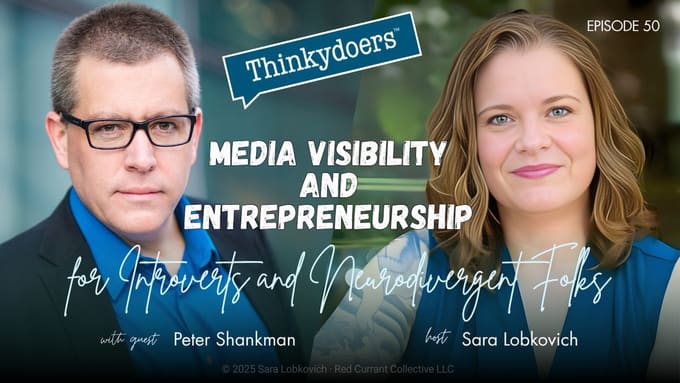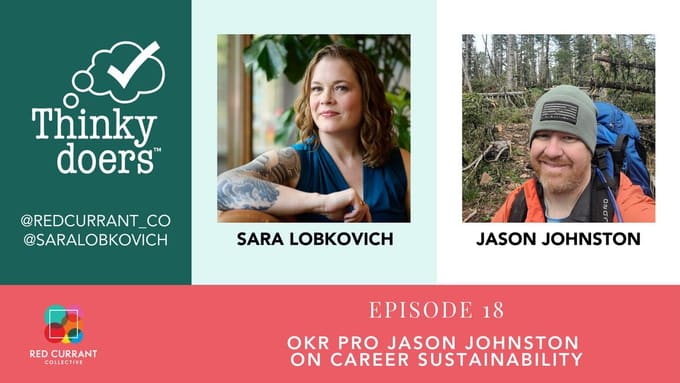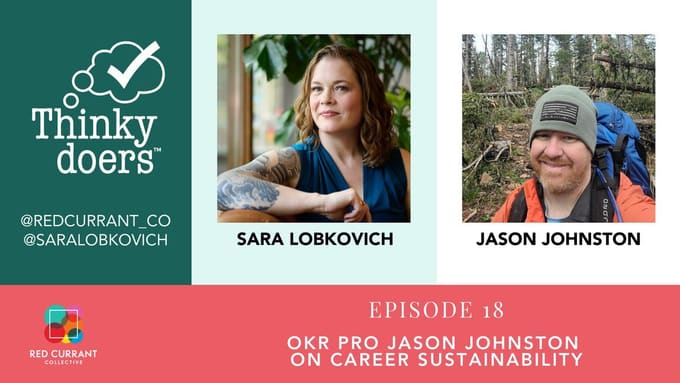How to Crush Analysis Paralysis and Achieve Goals for Q4 2024
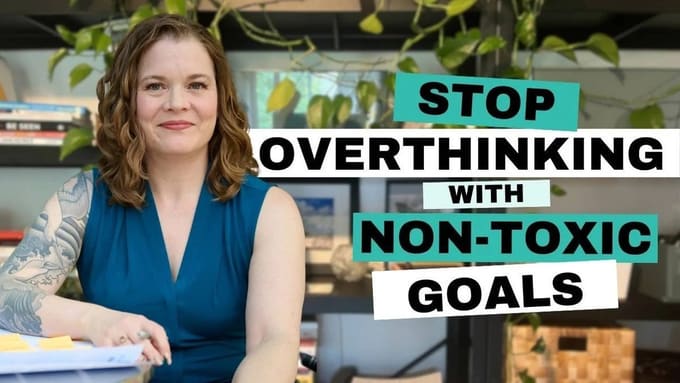
This blog post is a pre-launch preview of an upcoming Thinkydoers episode based on a YouTube Live delivered as part of my Goal Fridays series . This page will be updated to include the produced Thinkydoers episode once it’s available and published. In the meantime, you can watch the full replay via YouTube !

Are you stuck in a cycle of overthinking that’s paralyzing your progress?
Discover how to break free and achieve your goals with insights from strategy coach and OKR expert Sara Lobkovich.
In this episode of Goal Friday, Sara dives deep into the world of overthinking and analysis paralysis, offering practical strategies to overcome these common obstacles to goal achievement.
You’ll learn:
-
The psychological definition of overthinking and its impact on your productivity
-
How to recognize when you’re stuck in an overthinking loop
-
The surprising connection between anxiety, storytelling, and play
-
A powerful exercise to shift from overthinking to insightful, intuitive thinking
-
Strategies to manage self-doubt and boost your confidence
Sara shares personal anecdotes, scientific research, and practical exercises that you can implement immediately to crush analysis paralysis and make meaningful progress towards your goals. Whether you’re a chronic overthinker or simply looking to optimize your goal-setting process, this episode is packed with valuable insights to help you succeed in Q4 2024 and beyond.
Don’t miss out on this game-changing discussion that could transform your approach to goal setting and achievement. Tune in now and start your journey towards clearer thinking and greater success!
Are you one of the more than half of people who self-identify as a chronic overthinker?
If so, you’re not alone.
As someone who was rewriting content for this very live session right up until a few minutes before starting, I understand the struggle all too well. But today, we’re going to dive deep into the world of overthinking and analysis paralysis, and I’m going to share some powerful strategies to help you break free and achieve your goals.
What is Overthinking?
Before we dive into solutions, let’s take a moment to understand what we’re dealing with. From a psychological standpoint, overthinking is often defined as repetitive, unproductive thought. It involves dwelling on our thoughts, analyzing situations beyond what they actually merit, and often catastrophizing or imagining the worst-case scenarios.
But it’s more than just that. Overthinking and analysis paralysis are like your brain taking a simple math problem and turning it into calculus on a matrix of potential outcomes, risks, and uncertainties. It can leave you feeling overwhelmed and unable to make decisions or move forward.
The Impact of Overthinking
To better understand the impact of overthinking, I asked my social media followers about their experiences. Their responses were incredibly insightful:
-
“I’m repeating something over and over.”
-
“If I can just think of enough detail in the right order, I can sort it out, but I’m never done.”
-
“Overthinking feels like safety, but also floating away on a raft.”
-
“It keeps me stuck in the lab, constantly analyzing and scrutinizing from the sidelines, but never making it out to the field.”
-
“If I could reduce or manage my overthinking, I could breathe.”
These responses highlight the mental load, cognitive overhead, and anxiety that often accompany overthinking.
Breaking the Overthinking Cycle
So, how do we break free from this cycle? Let’s look at a simple diagram that illustrates the difference between an overthinking approach and a more balanced one.
[Insert diagram here]
When we have a tendency towards overthinking, we spend a long time in the thinking phase. Eventually, we decide to take action and start doing, but because we’ve overthought, we might overdo it. This delays the point at which we start getting information or data, further delaying our learning process.
In contrast, if we can make our thinking phase high-quality but short, we can get into the doing phase sooner. This allows us to start gathering information and learning earlier, kickstarting our curiosity and optimization process. The result? We spend less time in anxiety and more time in curious exploration.
The Power of Intuitive Thinking
One powerful way to combat overthinking is to tap into our intuitive thinking. A fascinating fMRI study showed that when people are asked about subjects they’re intimately familiar with, different parts of their brain light up compared to when they’re asked about unfamiliar subjects.
This intuitive thinking activates the amygdala (the sentinel of emotion) and the basal ganglia (the home of habit). It’s effortless and natural, like breathing. That’s the part of our brain we want to engage when we’re setting goals or solving problems.
The Big Think Exercise
To help you tap into this intuitive thinking, I’d like to share an exercise I call “The Big Think.” Despite its name, it’s not about overthinking – it’s about accessing your insight and intuition.
Here’s how it works:
-
Think about an issue you’re overthinking or a goal you’re trying to set.
-
Imagine yourself 90 days in the future, when this is no longer an issue for you.
-
Ask yourself: What’s different? What’s changed? What’s improved? What are you really proud of?
-
Spend 5 minutes writing down your answers.
-
Look at what you’ve written and ask: What is most important to achieve? Why does that matter?
-
Spend 3 minutes on this second part.
This exercise helps you externalize what change is most important and why it matters, providing building blocks for effective goal setting while keeping you out of overthinking mode.
Managing Self-Doubt
Of course, self-doubt often goes hand-in-hand with overthinking. Here are a few strategies to manage self-doubt:
-
Timed Wallow: Set a timer for 5 minutes to wallow in your self-doubt. Often, by the 3-minute mark, your brain gets bored and starts giving you a pep talk.
-
Reach Out: Connect with supportive friends, family, or colleagues when you’re feeling doubtful. They can offer perspective and encouragement.
-
Identify Needs: Take a moment to identify what need or pain point is causing the self-doubt. Is there something you can do to address it?
-
Change the Channel: If you’re stuck in self-doubt, try changing your environment or activity. Go for a walk, do something physical, or engage in a different task.
-
Practice Self-Compassion: Be kind to yourself. Remember, everyone experiences self-doubt at times.
Conclusion
Overthinking and analysis paralysis can be significant obstacles to achieving our goals, but they’re not insurmountable. By understanding the psychology behind overthinking, tapping into our intuitive thinking, and using practical exercises like the Big Think, we can break free from these patterns and make meaningful progress towards our objectives.
Remember, the goal isn’t to eliminate thinking altogether, but to find a balance that allows us to think effectively, act decisively, and learn continuously. So, as you approach your goals for Q4 2024, try implementing some of these strategies. You might be surprised at how much more you can accomplish when you’re not stuck in an overthinking loop.
Ready to crush your analysis paralysis and achieve your goals? Start with the Big Think exercise today and see where your intuition takes you!
If you’d like to hear in advance about additional Live Goal Friday events, join the email list here. This post will be updated to include an edited version of the original Live Video compiled as a Thinkydoers Podcast episode soon!
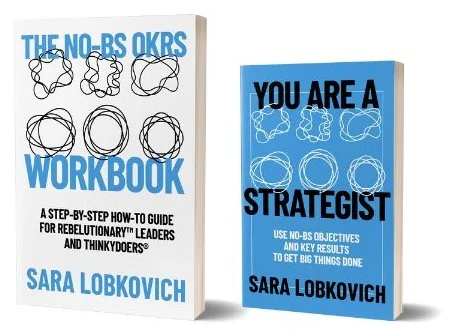
Get the Book
You Are a Strategist teaches you how to use No-BS OKRs to get big things done. Join 2,000+ coaches trained in this methodology.
Order Your CopyBest OKR Books of 2025
Curated reading list of the most impactful books on OKRs, strategy, and goal-setting. Includes classics and new releases with honest reviews.
See the List